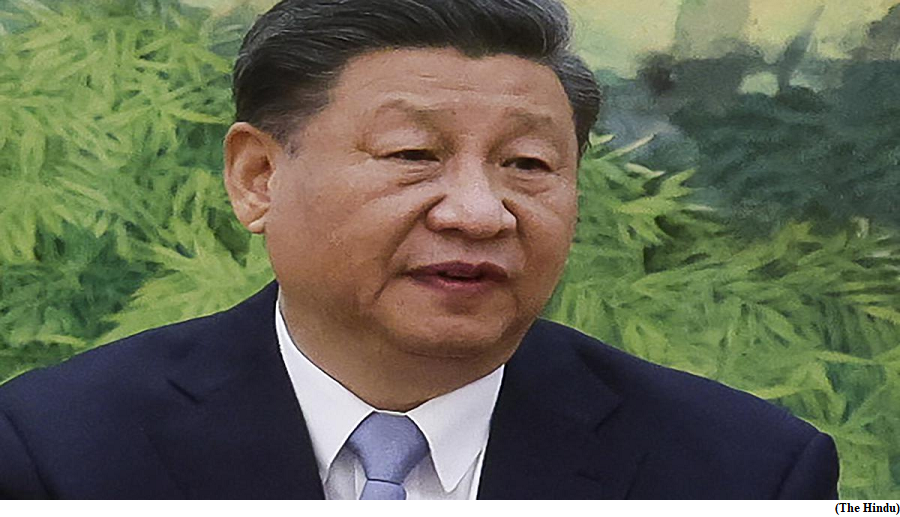China’s new law on foreign relations (GS Paper 2, International Relation)

Why in news?
- Recently, China adopted a new Law on Foreign Relations of the People’s Republic of China, which came into effect on July 1.
- The law will tighten President Xi Jinping’s control over foreign policy, which has, since his taking office in 2012, become increasingly centralised.
What is the new law?
- The law involves foreign affairs, it was drafted to “safeguard China’s sovereignty, national security and development interests”.
- The broader aim of the law appears to be aimed at giving a legal stamp to many of the key objectives of Chinese foreign policy under Mr. Xi, and to make it a punishable offence if individuals or organisations were deemed to act against those objectives.
- A border law was adopted in October 2021 that warned against “any act that undermines territorial sovereignty and land boundaries”.
What will be the impact on foreign policy?
- The centralisation of Chinese foreign policy under Mr. Xi now has a legal stamp, and challenging it may be deemed as a violation of Chinese laws.
- The law specifically mentions several key initiatives championed by Mr. Xi, such as the Belt and Road Initiative (BRI), the Global Development Initiative (GDI) and the Global Security Initiative (GSI).
- The law also emphasises sovereignty and security as being at the heart of Chinese foreign policy.
- The new law coincides with a broader political shift in China that many observers say has, for the first time in the reform era, prioritised security over development and opening up a key change that will likely have long-term political and economic ramifications.
Legal response to Western sanctions:
- One of the objectives was a legal response to Western sanctions aimed at China.
- The law will reinforce the Law on Countering Sanctions and will essentially make it illegal for Western companies operating within China to comply with sanctions aimed at the country.
- Besides sanctions, another section of the law appears to be a response to criticisms of China’s foreign lending which has come under scrutiny amid debt crises in several of its partners.
- According to Article 19 of the new law, in providing aid China would “respect the sovereignty of recipient countries” and “not interfere in their internal affairs or attach any political conditions to its aid”.
What does the new law mean for India?
- As with the Border Law adopted in 2021, the emphasis of security, sovereignty and territorial integrity as key tenets of Chinese foreign policy coincide with the border dispute returning to the centre of India-China relations.
- The Border Law as essentially looking to formalise China’s moves along the Line of Actual Control (LAC), with the transgressions of April 2020 upending both bilateral relations and decades-old mechanisms aimed at carefully managing the boundary dispute.
- The two laws also coincide with territorial disputes being framed by China as matters of national sovereignty rather than issues to be negotiated by two sides, framing that may narrow the scope for resolution.
Key provisions associated with Indian interest:
- Article 6 of the new law says all “state institutions, armed forces, political parties, people's organisations, enterprises, public institutions, other social organisations, and citizens have the responsibility and obligation to safeguard China’s sovereignty, national security, dignity, honour and interests in the course of international exchanges and cooperation.”
- Article 31 may have a potential bearing on the signing of agreements to resolve disputes, as it declares that “implementation and application of treaties and agreements shall not undermine the sovereignty of the State, national security and public interests”.
- Article 17 says the main aim of the conduct of foreign relations is “to uphold its system of socialism with Chinese characteristics, safeguard its sovereignty, unification and territorial integrity, and promote its economic and social development.”
- The law also says China will at the same time “grow relations with its neighbouring countries in accordance with the principle of amity, sincerity, mutual benefit and inclusiveness and the policy of enhancing friendship and partnership with its neighbours.”
- Another article that will be scrutinised, particularly by Indian and foreign companies operating within China, is Article 8, which declares that “any organisation or individual who commits acts that are detrimental to China’s national interests in violation of this Law and other applicable laws in the course of engaging in international exchanges shall be held accountable by law.”
- Article 33 says the government “has the right to take, as called for, measures to counter or take restrictive measures against acts that endanger its sovereignty, national security and development interests in violation of international law or fundamental norms governing international relations.”


